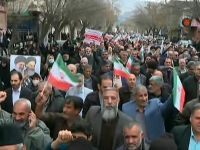The Arab League's Central Office for the Boycott of Israel (OBI) has prepared an action program to "fight" Israel's exports to Arab countries via third parties, the official Syrian Arab News Agency, SANA, reported. The draft will be submitted to the Arab League's next foreign ministers meeting, due on March 12 in Cairo, said SANA in a dispatch datelined from the Egyptian capital.
The program also provides for "the reactivation of the liaison offices" attached to OBI "in the Arab states in order to ban all possible dealings with boycotted companies," said SANA. It makes the attendance of Arab countries representatives to the meetings held twice a year at the OBI headquarters in Damascus "compulsory".
The program also calls for "the reactivation of joint Arab economic commissions abroad (in non-Arab countries) in order to uncover reexport operations of Israeli goods to Arab countries under fictitious company names." It also provides for the setting up of an Internet site and "an information action program explaining the goals of the boycott."
"Israel must feel that it cannot reap the fruits of peace without paying the price" of withdrawing from the Arab lands occupied in 1967, the program underlined. The OBI draft said Israel was losing three billion dollars a year because of the Arab boycott, without giving more details.
The Syrian government newspaper Tishrin on February 13 said OBI will meet on April 22 in Damascus to resume its activities put on hold eight years ago. The OBI is currently chaired by a Syrian Commissioner General, Ahmad Khazaa. It has not met on the executive pan-Arab level since April 1993 because of a lack of the required quorum set at two thirds of Arab states.
The office was set up in 1951 with an initial task to update every six months a "black list" of Israeli companies falling under the direct boycott of the Jewish state, or companies dealing with Israel from other countries, falling under the indirect boycott.
After the 1991 Gulf War and the launch of the Middle East peace process, most of the Arab states yielded to US pressures and gave up on the indirect boycott. — (AFP, Damascus)
© Agence France Presse 2001
© 2001 Mena Report (www.menareport.com)








